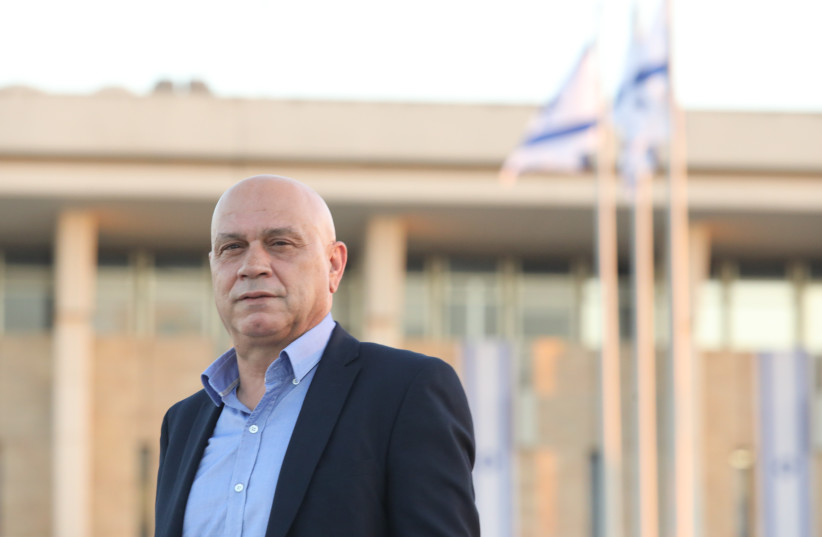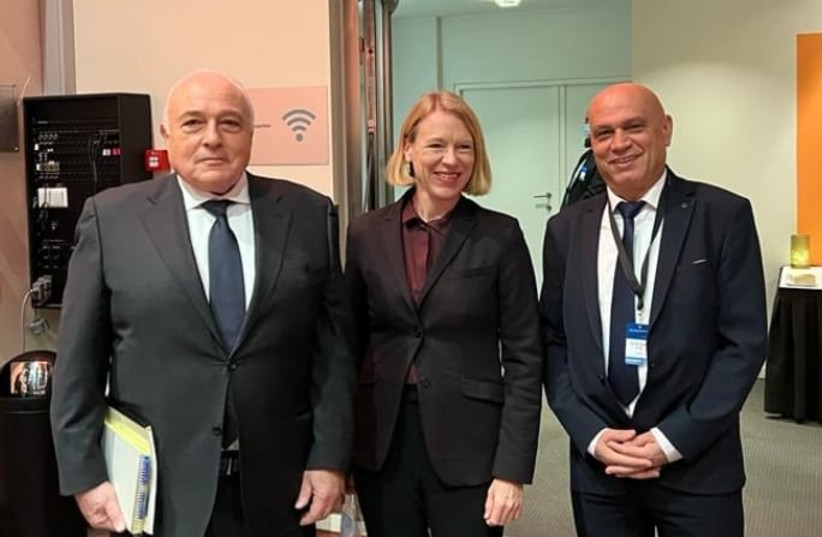The Palestinian Authority is likely to abolish its policy of providing monthly stipends to jailed terrorists and the families of terrorists who have killed Israelis, Regional Cooperation Minister Esawi Frej told Israel Radio on Wednesday morning.
"I believe that in the coming months this [PA] policy will change," Frej said, adding that a different mechanism would be created that would be acceptable to everyone. It was an allusion to past proposals to sway the PA to change its method of payment, which now provides the largest financial reward for those who have committed the most serious terror attack and the least reward for those only marginally involved in terror.
The international community would prefer a social welfare system for Palestinians jailed by Israel that provided equitable payments based solely on financial needs.
Frej spoke prior to Wednesday's meeting of the Ad Hoc Liaison Committee (AHLC) meeting in Oslo. It's a 15-member body chaired by Norway that meets at least twice a year to oversee donor funding to the Palestinians.
The minister heads the Israeli delegation to the AHLC that includes representatives from the Foreign, Economic and Defense ministries.

In advance of the AHLC meeting, the World Bank and the Office of the UN Special Coordinator for the Middle East Peace Process [UNSCO] published reports about the PA's dire financial crisis, warning that it faced a $1.36 billion deficit this year and may not be able to meet its salary payments.
AMONG THE issues highlighted by the World Bank is an 85% drop in donor funding over the last 13 years, from $1.2 billion in 2008 to $184 million this year.
Both reports spoke against Israel's policy of penalizing the PA for the terror payments, which Israel has dubbed, "pay-for-slay."
Israel withholds that sum, some NIS 50 million a month, from its transfer to Ramallah of the tax fees it collects on behalf of the PA. In August, Israel increased the sums it withholds to NIS 100 million monthly. But in light of the PA's financial distress, Israel in the fall provided the PA with a NIS 500 million loan to offset the money it had withheld.
In Oslo, Frej plans to ask donor countries that attend the AHLC to restore funding to the PA. On Wednesday morning, Israel radio quizzed him about the discrepancy in Israel's policy, which both penalizes the PA for pay-for-slay but helps it attain financial stability.
It's in Israel's interest to strengthen the Palestinian economy, Frej said. "No one is doing anyone any favors here," he said.
Frej added that he believed the situation would change. "I see there is a desire among the Palestinians to change this situation," he said, adding that the US is working on this issue as well. "They are also not releasing money because of this," he said.
UNSCO in its report to the AHLC also said that the "PA is weighing options for resolving the so-called 'prisoners payments' issue."
It explained that these payments "greatly complicate Palestinian relations with Israel and key donors. International technical assistance could help the PA instead strengthen its existing cash transfer program that targets the most vulnerable Palestinian households."
ON MONDAY, PA Prime Minister Mohammad Shtayyeh told his cabinet that he had no intention of backing down on this issue, adding that he would press donor countries to pressure Israel to halt its tax deductions.
Shtayyeh, who arrived in Oslo on Tuesday, had a private meeting with Frej. The two are also scheduled to meet publicly on Wednesday, as part of the AHLC discussions.
Frej has also met with PA Finance Minister Shuki Bishara and Norwegian Foreign Minister Anniken Huitfeldt.
While at the AHLC Frej also intends to speak of ways that the Abraham Accords, which normalize ties between Israel and four Arab countries, can also benefit the Palestinian economy.
FREJ IS also open to adapting the 1994 Paris Protocol that governs the financial arrangements between Israeli and the PA to better accommodate the situation in 2021.
It would be the first such change since the protocol was signed.

In advance of the Wednesday meeting, Huitfeldt spoke optimistically of the event, noting that contacts that had already occurred between Israeli and Palestinian officials in the last months had created a better atmosphere by which progress could be made on economic issues.
"The ongoing contact between the parties has created a new, more positive dynamic. The parties are seeking to revitalize their cooperation, particularly cooperation relating to the economy and trade," she said.
"This is crucial in order to strengthen the Palestinian economy, meet basic needs, especially in Gaza, and reduce the risk of further escalations of violence,’ Huitfeldt said.
"The economy in Palestine has been hit hard by the coronavirus pandemic," she said. "Poverty and unemployment are on the rise. The escalation of violence between Israel and Palestinian armed groups in Gaza in May brought further suffering to the civilian population."
The foreign minister added that although Gaza violence has not renewed, the situation both there and in the West Bank remains tense.
"I am concerned that the conflict could quickly flare up again, and I urge all parties to show restraint,’ she said.
The AHLC is composed of the EU, the UN, the IMF, the World Bank, the PA, the US, Russia, Norway, Japan, Saudi Arabia, Canada, Israel, Jordan, Egypt and Tunisia.
According to Norway, however, there are 30 countries and entities participating in Wednesday's meeting in Oslo.
.
